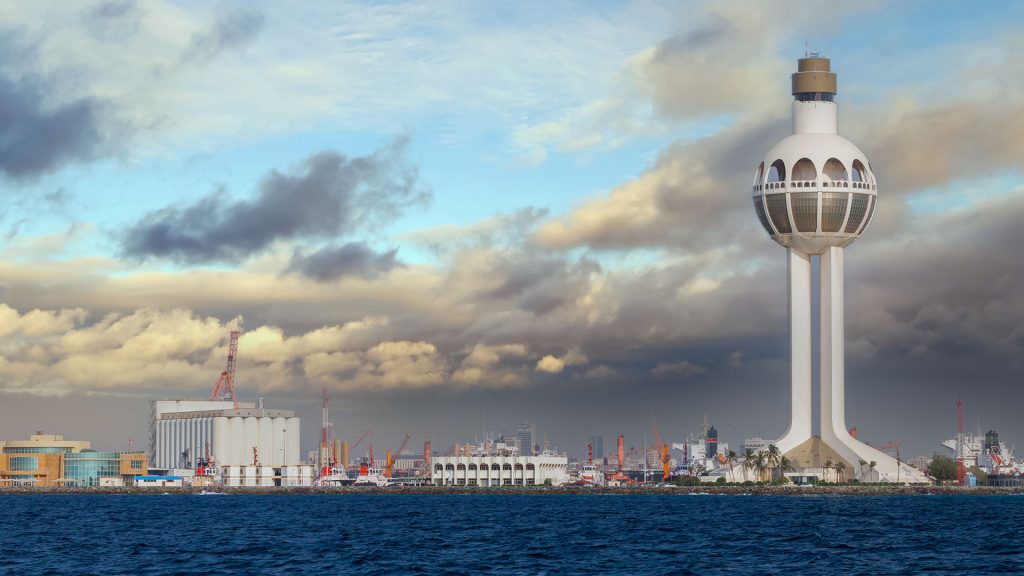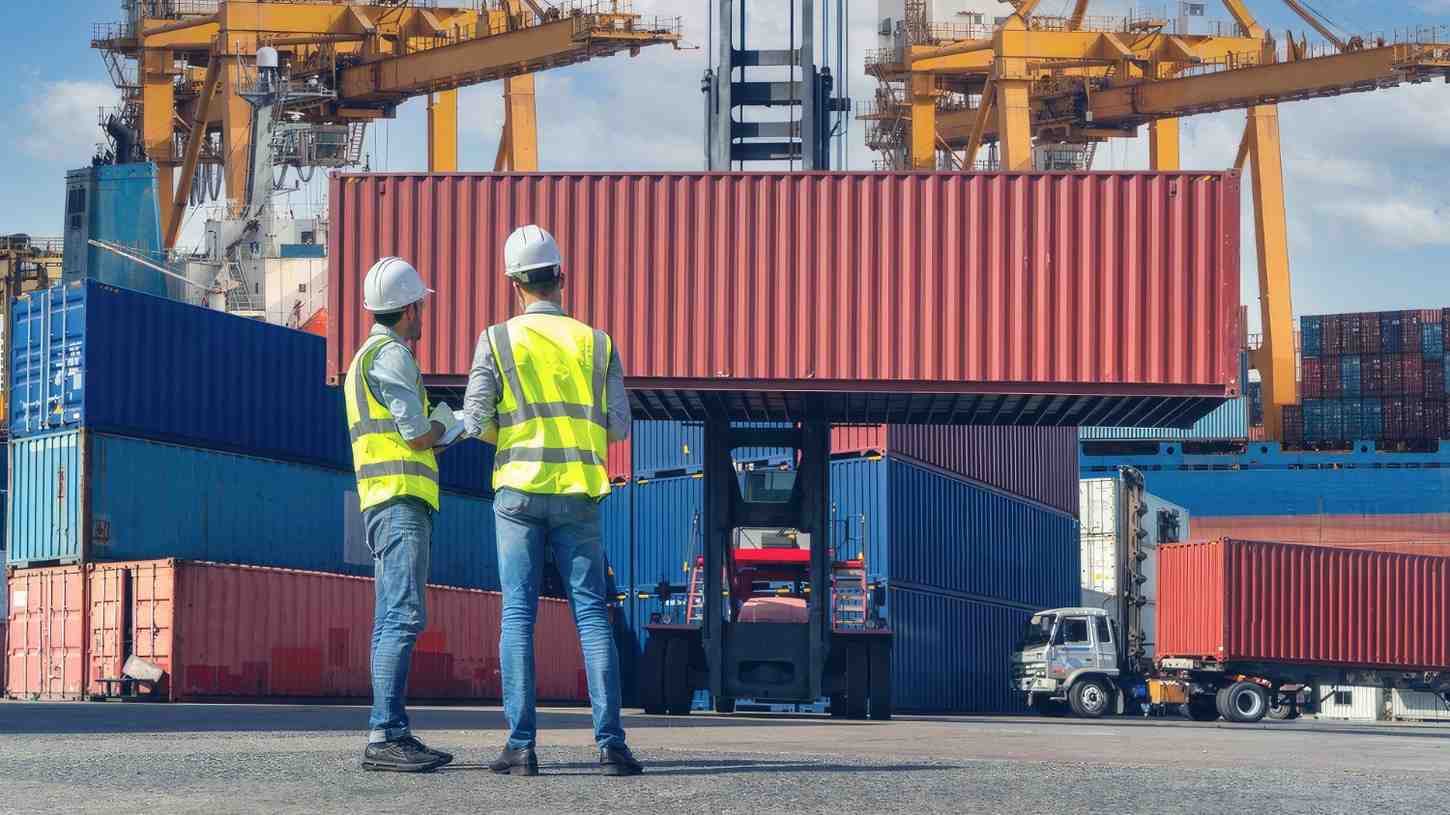
Saudi economic development officials have introduced a master plan to develop dozens of logistics hubs, with the objective of transforming the Kingdom into a worldwide logistics powerhouse. The country aims to use its strategic location, which connects Asia, Europe, and Africa. Saudi Arabia’s Ministry of Transport and Logistics Services (MOTLS) aims to grow its logistics business, improve export tactics, increase investment prospects, and form collaborations with the private sector. More precisely, the “Master Logistics Facilities Plan” envisions 59 centers totaling over 1 billion square feet. These include 12 logistics centers for the Riyadh region, 12 for the Makkah region, 17 for the Eastern Province, and 18 across the remaining regions of the kingdom. Current development work is focused on 21 centers, to complete them all by 2030.
According to Saudi Arabia, the finished centers will enable local industries to efficiently export Saudi products, as well as support e-commerce by facilitating rapid connections between logistics centers and distribution hubs within various regions, cities, and provinces. The plan also facilitates high-level tracking and eases the process of obtaining logistic activity licenses, particularly with the introduction of a “unified logistic license.” So far, Saudi Arabian authorities have granted 1,500 of those licenses to local, regional, and international logistics companies. One of those license holders is Kuehne+Nagel, the Swiss freight forwarder that announced it had gained such a title in 2021.
Saudi leaders claim that their efforts have led to a 17-place increase in the World Bank’s Logistics Performance Index (LPI), bringing the Kingdom to 38th place in logistics efficiency. The National Transport and Logistics Strategy (NTLS) aims to rank among the top ten by 2030. On the World Bank’s current list of logistics capabilities in 139 countries, the United States ranks 18th in terms of LPI score, trailing only Singapore, Finland, Denmark, Germany, the Netherlands, Switzerland, Austria, Belgium, Canada, and Hong Kong.
Historical Context of Saudi Arabian Logistics
The evolution of the logistics in the KSA began with the use of ancient trade routes for spices and incense that connected early civilizations, to what changed dramatically after the finding that oil was discovered in the 30th century: building solid infrastructures of transportation in support of exports of oil. In the 20th century, many ports were expanded, airports were constructed, and roads were developed to cope with the rapid increase in demands of trade. Some of the key developments here include the completion of the King Fahd Causeway in 1986 and the opening of King Abdullah Port in 2013, which has since grown into one of the world’s quickest-growing container ports.
There has been an acceleration in infrastructure development, supported by a huge investment coming from the government in the last few decades. Projects such as the North-South Railway and the Saudi Railway Organization (SRO) increased logistic capacity, and with it, the possibilities for domestic links and support for the movement of freight and exploitation of minerals. In addition, the sector has undergone transformational regulatory reforms meant to attract foreign investment and improve business logistics. These developments have positioned Saudi Arabia to leverage its strategic location and infrastructure to become a global logistics hub.
Current State of Saudi Arabian Logistics Infrastructure
The logistic infrastructure of Saudi Arabia forms part of its economic diversification plan, standing at state-of-the-art facilities that blanket the entire Kingdom within ports, airports, roads, and railways. The Kingdom has strategically developed its infrastructure to support the primary income source but also helps in enhancing global logistics capabilities.
Ports and Maritime Transport

It is, therefore, a hub for several major ports, with the King Abdullah Port being classified as a major port. The port is strategically set at the Red Sea and effectively enhances trade facilitation between Europe, Asia, and Africa. For this fast development, one can consider among the quickest expansions in container ports of the world; an automated system evolution, adapted for the largest ships on the planet. Another very important hub is the Islamic Jeddah Port; it contributes a lot to the movement of goods in and out of the region and acts as the main entrance of the Muslim pilgrimage traffic heading to Mecca.
Airports and Air Freight Capabilities
Key air freight hubs include the King Fahd International Airport, considered one of the largest worldwide in terms of area, and the King Khalid International Airport in Riyadh. These airports had expanded the cargo facilities to handle additional cargo traffic, in conformity with the global air transport logistics trends. These airports have played an important role in integrating Saudi Arabia with the Global Airfreight Logistics Network through enhanced cargo handling capacities.
Roads and Railways: Enhancing Domestic Connectivity
The road network across the Kingdom is of a wide magnitude and links major cities and logistic hubs with superlative highways. Recently added is the launch of the North-South Railway, connecting the industrial zones located in the south to the mineral-rich areas in the north. This forms an important component of the national strategy in leveraging the geographic and economic location of the Kingdom for the efficient movement of goods and minerals through and across the borders.
Technological Advancements in Logistics

The advanced systems include GPS tracking, automated inventory management, and the application of AI-driven logistic solutions that have been integrated through technology investment to further operational efficiency and allow the supply chain to stand even stronger for logistics leadership in Saudi Arabia.
Economic Impact of the Logistics Sector
Saudi Arabia’s logistics sector is a key contributor to the national economy, boosting non-oil GDP growth. It also has a significant impact on employment, creating countless positions throughout various sectors of the industry.
GDP Contribution
The logistics industry accounts for around 10% of Saudi GDP, a proportion that has steadily increased thanks to considerable government investment in infrastructure and regulatory changes. This contribution is likely to rise as Vision 2030 continues to be implemented, with the goal of diversifying the economy away from reliance on oil.
Employment and Growth
According to recent figures, the logistics sector employs hundreds of thousands of people, with professions ranging from storage and transportation to supply chain management and logistics planning. The sector’s rise is expected to generate even more possibilities, which is crucial for Saudi Arabia’s youthful and fast-expanding workforce.
Secondary Economic Benefits
Aside from direct economic benefits, the logistics industry promotes growth in related businesses such as manufacturing, retail, and e-commerce. Improved logistical skills enable these industries to run more efficiently, attracting foreign investment and fostering corporate growth.
Strategic Initiatives and International Partnerships
Saudi Arabia’s Vision 2030 includes big aspirations for the logistics sector. This aim involves expanding the efficiency of logistic services, improving intercontinental communication, and establishing the Kingdom as a worldwide logistics center.
Vision 2030 and Logistics
Vision 2030 outlines specific targets for infrastructure development, including the expansion of rail networks, port capacities, and airport facilities. Additionally, it focuses on regulatory reforms that ease business operations, aiming to improve the Kingdom’s ranking in global logistics indices.
International Partnerships
Saudi Arabia has formed various strategic alliances and agreements with global logistics behemoths to strengthen its capabilities. These collaborations are intended to share information, increase operational efficiency, and incorporate cutting-edge technology into the logistics industry.
Investments in Infrastructure
Significant investments have been made in logistics initiatives, such as the creation of the NEOM city project, which is intended to include automated ports and drone-based delivery systems, therefore setting new worldwide logistics standards.
Challenges and Opportunities in Saudi Arabian Logistics
While Saudi Arabia’s logistics sector has achieved significant progress, it still confronts obstacles such as bureaucratic inefficiency and regional rivalry. However, these challenges provide opportunities for development and innovation.
Challenges:
- Regulatory and bureaucratic barriers can hinder project progress and discourage foreign investment.
- Regional rivalry from logistics centers in the UAE and Qatar poses a challenge to market leadership.
Opportunities:
- Technological improvements create enormous prospects for digital transformation in logistics operations.
- The expansion of e-commerce in the region creates increased demand for logistics services, notably last-mile deliveries and reverse logistics.
Conclusion
Saudi Arabia’s logistics sector is experiencing a tremendous transition, according to Vision 2030 and the Master Logistics Facilities Plan. These programs seek to capitalize on the Kingdom’s strategic geographic and economic assets by establishing a technology-driven logistics framework that improves infrastructure and promotes a business-friendly environment. Saudi Arabia is well-positioned to increase its standing in the World Bank’s Logistics Performance Index, to reach the top 10 by 2030. This transformation has the potential to diversify the economy away from oil while also increasing jobs and generating broader economic benefits.
Challenges such as bureaucratic inefficiency and fierce regional rivalry need ongoing innovation, but they also provide chances for technical improvement and growth in the logistics sector. As Saudi Arabia builds on its historical trade strengths and current infrastructure advancements, it is prepared to create new worldwide benchmarks for logistics efficiency and integration, redefining logistics excellence on a global scale.
Get a step ahead in the future of global business with expert logistic solutions. Contact Wahyd Logistics and take your global business to the next level.






